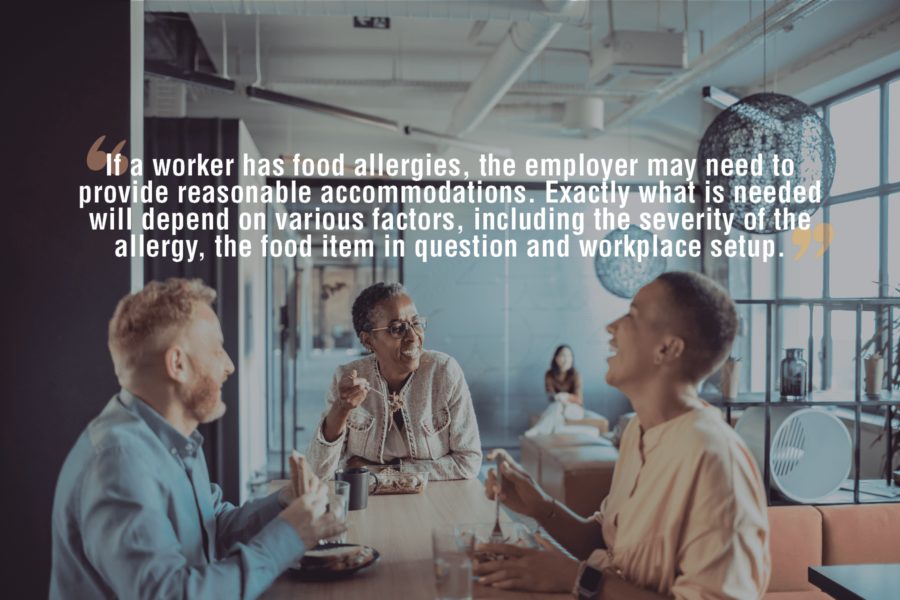People with food allergies must be very careful about what they eat. One bite of the wrong thing, and they could have a serious, possibly fatal, reaction. Given this risk, they have a good reason to want to make sure their work environment is free of allergens and that they’re safe at their job. Here’s what employers need to know about accommodating food allergies in the workplace.
Should employers take food allergies seriously?
Food allergies are very serious. However, there are many misconceptions about food allergies. According to the American College of Asthma, Allergy & Immunology, 49 percent of Americans admit that they are only somewhat or not at all knowledgeable about food allergies. For example, many people don’t know the difference between a food allergy and food intolerance.
Misconceptions can lead people to respond to food allergies in ways that might be unhelpful, or possibly even dangerous. To help keep workers with food allergies safe – and to avoid potential legal issues – employers should take food allergies seriously. It may be necessary to educate employees and co-workers about the seriousness of food allergies. Managers may also need some education and training.
What are food allergies?
A food allergy is typically more severe than a food intolerance. A food intolerance means a person’s body has trouble digesting a food. Food allergies occur when a person’s body has an immune response to certain foods. This response can be serious. When it causes anaphylaxis, it can be deadly.
According to Healthline, other symptoms include abdominal cramps, vomiting, diarrhea, skin rash and swelling. However, even if symptoms have been mild in the past, a more serious reaction is possible, including a possibly fatal anaphylaxis reaction.
According to the CDC, there is no cure for food allergies, so people with food allergies must be careful to avoid the food in question. In the U.S., the eight foods that trigger the most serious allergic reactions are peanuts, tree nuts, milk, eggs, crustacean shellfish, soy and wheat. Some people may be allergic to other food items.
How common are food allergies?
According to Food Allergy Research & Education, about 10 percent of adults in the U.S. have a food allergy, and food allergies are becoming more common. Every year, 200,000 people in U.S. need emergency medical care for an allergic reaction to food.
The high rate of food allergies means that if your workplace has 10 or more employees, there’s a good chance that at least one of those employees has a food allergy.
Are workers with food allergies protected under the Americans with Disabilities Act?
The Americans with Disabilities Act (ADA) gives workers with disabilities certain rights, including the right not to be discriminated against and the right to reasonable accommodation at a job.
The American Academy of Allergy, Asthma & Immunology says that food allergies are usually considered a disability for the purposes of the ADA.
The EEOC says that the ADA was amended in 2008 to expand the definition of “disability.” The new definition includes “chronic impairments with symptoms or effects that are episodic rather than present all the time can be a disability even if the symptoms or effects would only substantially limit a major life activity when the impairment is active.”
In 2013, the Iowa Court of Appeals ruled that this expansion means the ADA covers conditions like severe allergies and epilepsy, according to USA Today.
How can employers accommodate a worker with a food allergy?
If a worker has food allergies, the employer may need to provide reasonable accommodations. Exactly what is needed will depend on various factors, including the severity of the allergy, the food item in question and workplace setup.
The EEOC says that the employer may request documentation to support the existence of an ADA-protected disability and the need for accommodation, if this is not obvious. Once this has been established, the employer should use an interactive process to determine what accommodations are appropriate.
According to the Job Accommodation Network, some general accommodations should be considered to make the workplace safe for a worker with food allergies. These accommodations may include implementing a policy that restricts the food item in question from the workplace. To do this, the employer may need to place signs at the entrances and send notices to employees. The notices may also instruct employees who have eaten the food in question to notify others when coming into the office to avoid accidental exposure. To make sure that employees adhere to the policy, it is important to establish consistent consequences for violations.
Other possible accommodations include modifying policies to let an employee eat at his or her desk and away from the food that other people are eating, making appropriate travel and hotel accommodations if business travel is needed, and making schedule modifications if needed for care. Work-from-home options may also help employees manage their food allergies safely.
Employers May Be Sued
Employers that do not take food allergies seriously may be sued for discrimination.
According to Business West, Panera LLC was sued by a former employee who claimed that the company allowed harassment against him due to his food allergies and therefore violated Title VII of the Civil Rights Act. According to the allegations, the manager and coworkers teased him about his peanut allergies and even played “pranks” that exposed him to peanuts.
What if a worker has an allergic reaction at work?
If someone has an allergic reaction, fast action can make the difference between life and death.
According to Food Allergy Research & Education, severe symptoms of an allergy may include shortness of breath, wheezing, a repetitive cough, dizziness, a weak pulse, feeling faint, appearing pale or blue, having trouble breathing or swallowing, throat tightness or hoarseness, significant swelling of the tongue or lips, widespread hives or redness, repetitive vomiting, severe diarrhea, anxiety or confusion. Severe reactions can lead to fatal anaphylaxis and should be treated with epinephrine.
People with food allergies may carry an epinephrine autoinjector – or EpiPen – in case they have a reaction. If you suspect that someone is experiencing anaphylaxis, get emergency medical help immediately.
Do you need HR help?
Navigating food allergies and other complex HR issues can be difficult, and mistakes can lead to costly legal action and poor worker morale, as well as putting workers in physical danger. If you need assistance, we offer a single source solution through HR and Benefits Services.





